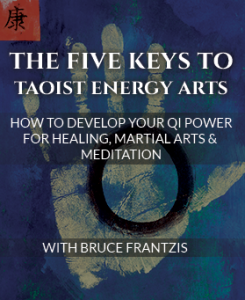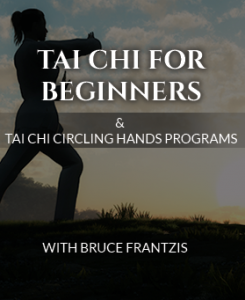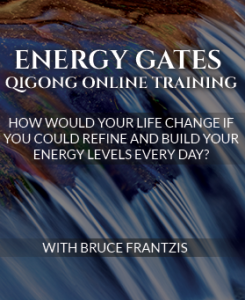Tai Chi for Body Support
Tai chi’s gentle, non-jarring movements support bodily functions in three basic ways:
- Tai chi trains the major ligaments that serve as the springs of the body. Anatomically, the human body is kept upright by ligaments, not bones, as is commonly believed. Ligaments are also critical in keeping your internal organs from impinging on each other and thereby downgrading their functions.
- Tai chi tones the muscles.
- Tai chi trains biomechanical alignments, which enables the bones and internal organs to withstand the forces of gravity that pull on all the other parts of your anatomy attached to them.
Tai Chi Massages Your Internal Organs
The movements of tai chi continuously massage your internal organs, including lungs, heart, liver, kidneys and spleen. Constant turning of the waist and limbs creates gentle internal pressures that create beneficial compressions in your organs.
Taking care of your internal organs is important because your life and health depend on them. The stronger they are, the better you can perform in any area of your life.
Tai Chi Stretches the Body
In tai chi, stretching occurs by gently letting go of the tension in your muscles, rather than by pushing or forcing muscle fibers to stretch. Relaxing the muscles in combination with slow-motion movement gradually stretches them.
What is unique about tai chi movements is that they stretch not just the large muscles, but also hundreds of smaller muscles. Although Western exercise programs are beginning to include stretches of these smaller muscles, most don’t and even when they do, they often don’t do it as effectively.
Tai Chi Reduces Pain in the Back, Neck and Shoulders
Tai chi does a wonderful job of relieving back, neck and shoulder pain by loosening up all the muscles of the upper body. The emphasis on flowing relaxation is especially useful for softening muscles that become stiff through repetitive daily activities.
Recovering from Injuries
In Asia and the West, I have repeatedly seen tai chi make a real difference in how people recover from car accidents, other forms of serious physical trauma, or surgery, in significantly less time than normally projected as being possible. Tai chi can also help increase the healing rate for damaged organs.
I personally used the Yang and Wu styles of tai chi to rehabilitate myself after a spine-smashing car accident. —Bruce Frantzis
Tai Chi Regulates the Movement of Fluids in the Body
One of the major effects of tai chi is to improve and regulate the movement of all the body’s fluids—blood, lymph, synovial fluid (between your joints), cerebrospinal fluid (within the spinal column) and interstitial fluid (between your cells).
Physically, tai chi moves the different body fluids by creating a series of ‘pumps’ within its specific movements. The pumps vary from large ones, like the entire spine, belly, leg or arm, to tiny pumps within specific internal organs, joints and between the vertebrae.
Energetically, the stronger the flow of chi (qi), the smoother and more powerfully your bodily fluids move. Chi is the energetic activator that tells all your bodily fluids when to move and how. As the fluids move more, the strength of your chi increases and vice versa.
Tai Chi Increases Breathing Capacity
Most people ignore their breath. The thought of deliberately exercising their lungs and diaphragm to extend their length of breath and air intake volume is completely foreign.
Practicing to increase your breathing capacity helps your normal breath to become significantly deeper and longer lasting, putting a lot more oxygen into your system.
Tai chi increases your breathing capacity, regardless of whether or not you deliberately practice its specific breathing techniques.
Tai Chi Increases Chi Flow
Tai chi movements generate increased chi flow through the body’s acupuncture meridian lines and through the channels of other energy systems in the body, such as the left, right and central energy channels.
As a result, you effectively cultivate more chi in several ways. You can unblock, balance, and open the flow of chi moving within and through your energy channels. Equally, increasing the flow of fluids within your body also increases the flow of chi, as they are inextricably linked.
Tai Chi Reduces Stress
Tai chi trains you to feel progressively more deeply inside your body. With tai chi practice, you develop an awareness of where your body holds tension within itself, which gradually becomes integrated into your daily life. You begin to notice how your neck and shoulders tense when working long hours at your desk or computer, what happens inside your body when you are angry or sad, or how mental exertion under pressure causes your body to fatigue.
From the perspective of stress, the techniques of tai chi are more about training your central nervous system than your muscles. It is jangled nerves that lie at the root of anxiety, particularly in our technological age with so much intellectual activity. This anxiety affects almost every population group—from babies to the elderly.
Overloading the brain directly affects your nervous system, resulting in a fight-or-flight response that induces tension and causes the nerves to overload. Over time, this can produce a condition in the brain and nerves, where almost any thought or decision, no matter how small, causes anxiety.
The regular practice of tai chi teaches you to consciously relax your mind and body before it starts to tense, and prevents the condition from being painful or chronic. Because chi moves through the central nervous system, the process of relaxation begins by smoothing out the functioning of the nerves. Relaxing the muscles is only part of this process.
Tai Chi Fosters Emotional Relaxation
As your nervous system opens up and loses its resistance to change, tai chi helps you gain access to and let go of the nastier emotions that tear up your insides: hatred, jealousy, self-pity, greed, inappropriate anger and more. Maintaining emotional negativity requires tension that can destroy much of life’s joy.
A relaxed muscular and nervous system provides the required support base in which your new, more open and free emotions can live and thrive. Releasing the physical tensions in muscles, organs, tissues and your nervous system provides the support to relax emotionally and maintain a sense of tranquility from deep within.
Tai Chi Fosters Mental Relaxation
Stress usually causes the mind to speed up, become erratic and produce jangled, disassociated thoughts. The Chinese call it the “monkey mind.” The more you relax, the more your conflicting thoughts slow down and lose their force. You can then see things with more clarity and less frustration.
Mental relaxation will help you:
- Settle down and become calm, allowing you to focus on the task at hand
- Multi-task without mental tension and distraction
- Connect your brain to your body without strain
- Become aware of single or multiple thoughts without becoming tense and feeling yourself pulled in different directions
- Gain deeper insight and allow ideas to emerge naturally
For many, letting go of the mental tensions that bind is infinitely more useful to everyday life than tai chi’s effects on physical abilities. Being able to think with clarity and not have your thoughts churn and jangle your nervous system provides a profound sense of well-being.
Tai Chi Fosters Energetic Relaxation
Most Westerners do not relate to the concept of energetic relaxation and tension.
Relaxation causes chi to flow smoothly and fully. Tension causes chi to flow erratically, in a jerky, spasmodic manner and with significantly less power. When chi moves smoothly, it has a natural balancing quality that helps the body to regenerate. The smoother the chi flow, the stronger and healthier the body becomes. That is why people can be simultaneously relaxed and strong.
Gradually, it becomes obvious that when your chi flows smoothly, relaxation follows it like a shadow, and vice versa.
Spiritual Relaxation
The practice of tai chi may turn you towards meditation and spirituality. You may gain the true strength and confidence to attempt to relax the obstacles that have bottled up truth, honesty, faith, kindness, generosity, love and whatever other qualities may be stunted. These obstacles prevent the full flowering of your soul.
If your heart is sincere, tai chi can be used as a focal point for relaxing the mind-body shackles that bind your soul or inner essence, and through which you experience the human condition. Tai chi, at increasingly subtle levels. will help you examine your emotional demons, thought processes, subtle perceptions and your acceptance of what is possible to change. Tai chi can also free you from your desires and attachments, both positive and negative, your sense of identity or self-worth, and your relationship with your innermost essence.
Tai Chi: A Miracle Health Exercise
Few health exercises have stood the test of time for as long as tai chi. This low-impact exercise can do as much or more to improve overall health and relieve stress as aerobics and other exercises. It improves muscle function and the circulation of blood in your cardiovascular system without generating potentially damaging shocks or trauma to the joints and organs. It keeps everything inside you healthy, from the smallest muscles to ligaments, joints, bodily fluids, vertebrae and internal organs.
Besides being a great whole-body workout, tai chi helps you to reduce and manage pain of all kinds, and to recover more rapidly from trauma.
Tai chi can also serve as a form of moving meditation, helping you release energetic blockages, negative emotions, churning thoughts and embark on a profound and spiritual path.
Clearly, the earlier in life you start practicing tai chi (taiji), the greater your physical and mental capacities will be in old age. However, many people basically ignore their health until the natural healing and physical capacities of youth start to wane.
Wake-up Call or Desire to Simply Feel Better
Suddenly, you get a wake-up call. Or maybe an injury that could heal in a couple of days previously now lingers on for a couple of weeks. And when you stay up all night with little sleep, you feel out of sorts for several days until the weekend when you can rest for a whole day or more. Maybe you find that you suffer from colds and other viral illnesses more often. General tension and anxiety seem to last longer. Your libido may decline.
These are all signs that poor health habits are catching up with you.
Commonly, these wake-up calls happen to people in their 50s. Unfortunately, there is a growing number of younger people burning out and experiencing these problems in their 30s and 40s—some, even in their 20s.
You can ignore the warning signs and stay in denial (not just a river in Egypt!), or you can do something right now to reverse the damage and begin regenerating your body, mind and spirit—regardless of your chronological age.
The Tai Chi Solution
How? Tai chi is the answer. Tai chi’s goal is to make you functionally younger.
Now, you may be in your 50s and yet, be pretty darn healthy. If so, there’s no doubt that you’ve managed to do something or many things right, and you probably already recognize that maintaining your good health will allow you to continue enjoying your active and fulfilling lifestyle.
Realizing the full potential of your dreams and making positive contributions to your family and society all starts with your health.
In China, half of the people who practice tai chi begin after age 50. It was mind-blowing for me to watch so many older people regain the strength and vitality that most people have in their 20s and 30s. All of them told stories of how tai chi made them feel better throughout their whole day.
Practitioners in their 70s and 80s told the same stories, but with a much greater sense of gratitude.
It opened my eyes to the nature of living a whole life. As a youth growing up in the 1960s and 1970s, I, like most everyone else in my generation, believed life was basically over when you were old. And old was anyone over 30!
Tai Chi’s Special Benefits for Practitioners Over Fifty
Although all practitioners can expect to gain the range of tai chi’s (taiji) health benefits, practicing tai chi has special benefits for people over 50. Tai chi:
- Increases physical balance
- Regulates and lowers blood pressure
- Improves circulation
- Promotes a good night’s sleep
- Re-establishes biomechanical alignments
- Restores sexual vitality
Many health studies conducted in China and the West show how tai chi and other Taoist practices improve health.






I would have never anticipated the subconscious benefits of tai chi on the normal functioning of my body. I can now understand how the aging process should be welcomed and not dreaded.
Thank you so much for sharing the tips on Tai Chi, Very well written article with lot of information